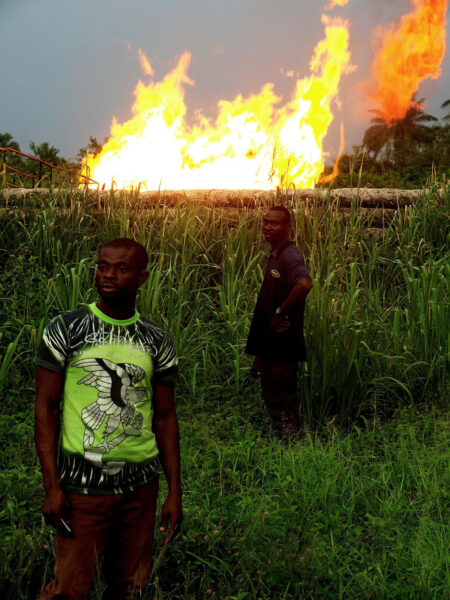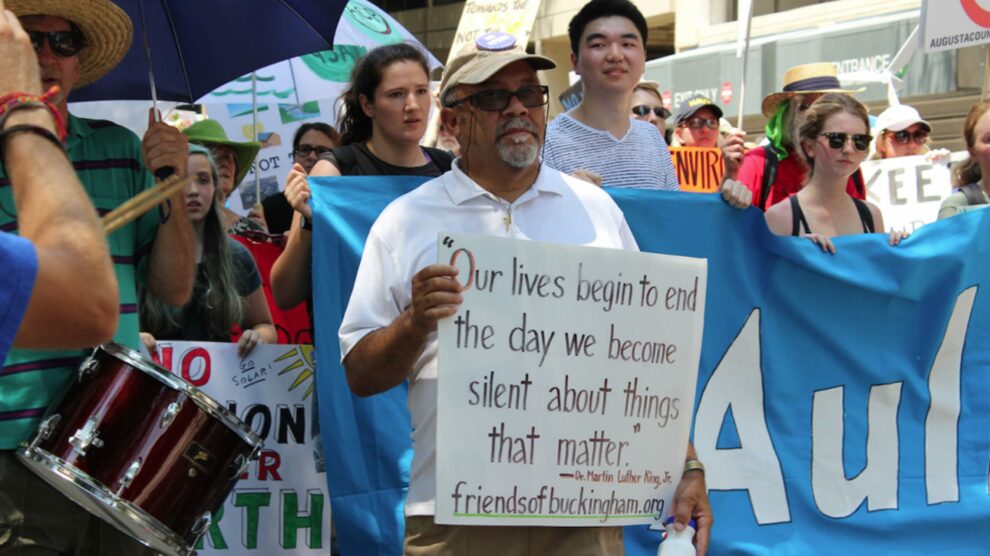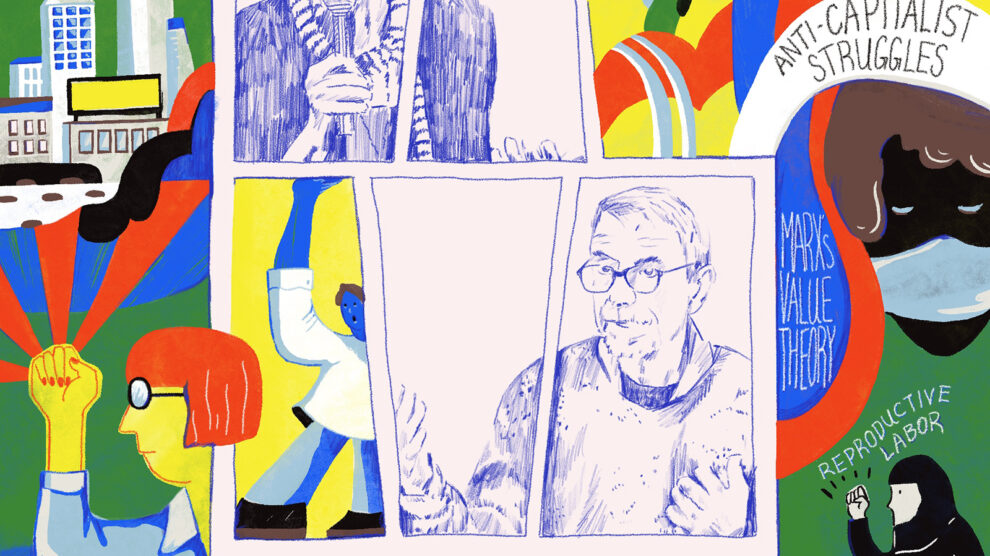Cooking the Niger Delta: Cook Stoves, Gas Flares and the Story of Waste
By Jennifer Tang
Volume 23, number 2, People’s Green New Deal

Lire un version de cet article en français ici.
Introduction by Nnimmo Bassey
Gas furnaces were lit in the Niger Delta, Nigeria, in the 1950s when crude oil production became a commercial enterprise. Since then routine gas flaring has been the norm and billions of cubic meters of these gases containing methane, sulfur and nitrogen oxides have been pumped into the atmosphere annually, clearly contributing to the global warming crisis. Efforts to end gas flaring through legislation and with appropriate sanctions have been resisted by the oil companies in a pattern that started in the colonial era.
We note that in the 1960s Shell claimed that there was limited demand or no market for gas. In other words, they had no option but to burn the by-product of crude oil extraction. 1 In their 2017 Annual Report, Shell claimed they had to strike a delicate balance in the transition “to a low-carbon energy future to manage the risks of climate change, while also extending the economic and social benefits of energy to everyone on the planet.”2 This is a way of saying they wish to do good for the climate, but are hampered by the need to give the people a good life. How credible is this claim when we know that they are motivated first and foremost by profit?
Gas flaring, an act of ecological irresponsibility, continues to impoverish communities and damage their health and economic wellbeing. It discounts the people’s human rights and the right to human dignity. Communities with gas flares are very likely to be more vulnerable to the ongoing COVID-19 pandemic, as their health is already impaired through blood disorders, bronchitis, asthma, and other respiratory diseases.3 Then there is the acid rain caused by the mixing of moisture in the atmosphere with the sulphur and nitrogen oxides released by the flares. Soil health is also impacted, having a direct consequence for agricultural productivity. The people’s struggles against gas flaring have been struggles for life.
Jenny Tang’s article captures the image laundering efforts of oil companies operating in Nigeria as they promote biomass-based so-called efficient cookstoves and present cooking gas as a clean bridge fuel in tackling climate change. The paper accurately captures the fact that implementation of the Paris Agreement would not eliminate global dependence on burning fossil fuels because of inherent loopholes inserted by fossil industry officials.
Shell’s continued development of new oil and gas fields clearly negates any hope of reaching climate targets, as exploitation of even the already developed fields would exceed the 1.5- or 2-degree Celsius targets. In addition, the massive hydrocarbon pollution of the Niger Delta equally negates any effort at achieving any of the Sustainable Development Goals, a target that the so-called efficient cookstoves and gas stoves may claim to be pursuing. This paper shows the hypocrisy of oil companies who discourage investment in renewable energy sources, who claim to be tackling climate change and to be promoting social benefits while actually locking vulnerable communities deeper into poverty and unhelpful energy pathways.
—Nnimmo Bassey
Cooking with Gas
Burning solid fuels like wood and charcoal in traditional, inefficient cookstoves causes air pollution and contributes to climate change. Exposure to smoke from cooking causes over four million premature deaths per year, making it “one of the world’s biggest—but least well known—killers,” and causes “serious problems for the health and livelihoods of these families, hampering their ability to escape grinding poverty.”4 This problem is well-known and has attracted attention from many international development and health programs.
In 2010, Shell Foundation, the UN Foundation, and the US State Department co-founded the Global Alliance for Clean Cookstoves (“the Alliance”), a public-private partnership that seeks to make life easier for the “three billion people [who] cook food and heat their homes using solid fuels in traditional cookstoves or over open fires.”5 In October 2018, the Global Alliance for Clean Cookstoves changed its name to the Clean Cooking Alliance “[t]o more accurately reflect its industry-building approach for cookstoves and fuels.”6 As it turns out, many of the improved biomass stoves that were distributed through the Alliance failed to deliver on their health and climate claims. According to investigative journalist Sara Morrison, the Alliance, having “spurned propane simply because it seems politically incorrect,” will now, moving forward, make greater efforts to market stoves that burn propane or liquefied petroleum gas (LPG), because these stoves “burn much more cleanly and efficiently than nearly all biomass stoves, reducing the harmful smoke given off during cooking while having a negligible impact on the climate.”7
Far from spurning LPG out of a desire to be politically correct, the Alliance has from the outset sought to market LPG as a modern, clean fuel and to access subsidies to do so. Further, LPG does not have a “negligible impact on the climate,” but is a byproduct of oil and gas production and commercializing it will make existing and future fossil fuel reserves more valuable. While fossil fuel companies often market gas as a bridge fuel to fully renewable energy options, they have also deliberately blocked investments in renewable infrastructure and falsely characterized renewables as intermittent.
LPG, the Alliance, and Nigeria
This intrusion into national politics is especially true in Nigeria, where Shell and its partners, through the Alliance, have assisted the Nigerian government with writing legislation that privileges access to fuels like LPG under the guise of renewable energy policy.
In 2015, Shell spent more money on social investments in Nigeria than it had in any other country.8 Nigeria has Africa’s largest GDP and is the top oil exporter of the continent.9 All oil and gas is explored and produced through joint ventures between fossil fuel companies and the Nigerian government. Oil revenues account for approximately 70 percent of government revenue and more than 90 percent of its export earnings in 2017.10 Most of the fossil fuels that are produced in Nigeria are for export, mainly to Europe.11
Despite being the largest producer of oil in Africa, Nigeria lacks domestic fossil fuel infrastructure, and most people who live outside the rich urban centers do not have access to electricity or cooking gas. Nigeria’s Sustainable Energy for All Action Agenda, published by the federal government, states that 98 percent of residential energy demand comes from biofuels and waste, most of it used for cooking purposes.12 Wood is commonly used for cooking because it is either free (especially in the South) or relatively cheap compared to other cooking fuels. Those who do have access to electricity often rely on diesel generators. The authors of this report note that “household energy demand is known to be mostly guided by prices of fuels and appliances, disposable income of households, availability of fuels and appliances, and cultural preferences.”13
Shell and the Alliance have, from the start, sought to increase household energy demand for LPG by promoting subsidies for LPG, increasing the availability of LPG and LPG stoves, and influencing cultural preferences towards greater LPG adoption:
- In 2008, Nigeria’s largest energy group, Oando PLC, acquired Shell’s stake in two offshore oil blocks for $625 million (USD).14 In 2009, the United Nations Environmental Programme (UNEP) and the German Federal Ministry of Environment (BMU) created the African Carbon Asset Development Facility (ACAD), which lent its support to a partnership between Oando PLC and Alitheia Capital to commercialize LPG.15
- In a 2011 deck prepared by Accenture for Shell and the Alliance, there are entire sections dedicated to increasing LPG adoption and creating an enabling environment for households and businesses, by reducing the value added tax on domestically produced LPG, transferring Nigeria’s kerosene subsidy to LPG, and “reduc[ing] the perception that LPG is significantly more expensive than other fuel sources.”16
- On March 20, 2012, the Nigerian “chapter” of the Alliance was launched in Abuja. Members include the Bank of Industry, US Agency for International Development, International Research Center for Energy and Economic Development, Heinrich Boell Foundation, the German Gesellschaft für Internationale Zusammenarbeit, Shell, Oando, the Energy Commission of Nigeria and the Federal Ministries of Environment, Women Affairs and Health.17 On November 13, 2012, these and other stakeholders convened in Abuja at the “LPG as a climate control tool in Africa: The Sustainability Agenda” forum.18
- The Alliance has also influenced renewable energy policy in Nigeria to include LPG. For example, Nigeria’s Renewable Energy Programme includes the National Clean Cooking Scheme (NCCS) which “focuses on using social networks in rural settlements to facilitate increased use of improved woodstoves, LPG, ethanol and biogas.”19
- The entirety of a deck presented in January 2017 for the Alliance, Africare, and McCann Global Health is dedicated to driving demand for LPG stoves and fuel in Nigerian households.20
Shell’s website notes that “[p]eople don’t always have a choice of fuels, however, primarily due to availability and affordability. Electric stoves, for instance, have no emissions during use, but are limited to areas with grid access.”21 But what Shell’s website doesn’t note is its own role in limiting grid access.
Gas flares, fossil fuel colonialism and Ogoni resistance
Why is it that a resource rich country like Nigeria lacks the domestic infrastructure to meet the electricity and cooking needs of its people in the first place?
History clearly shows that the British colonial government and Shell denied the Nigerian people access to energy options. The oil fields of the Niger Delta contain both associated gas and crude oil, both of which could potentially be used as fuel. However, because crude oil takes up less volume than unrefined gas and so is easier to transport, and because the final consumer of this product lived in Europe, Shell and the British colonial government, acting “in tune with the norm of the colonialist that engaged in resource extraction purely for export and profit expropriation,” from 1956 onwards, decided to cut costs by instead burning off the excess associated gas. As a result, not only were Nigerians denied access to an electric grid; their air was poisoned with caustic fumes and their earth poisoned with wastewater.22 According to activist and scholar Dr. Isaac “‘Asume”’ Osuoka, gas flares don’t happen by accident, but are the result of a blatant disregard for the right of people to not be poisoned on their own land.23
After decades of oil spills, gas flaring, and injustice, in the 1990s, the Ogoni people of the Niger Delta mobilized as the Movement for the Survival of the Ogoni People (MOSOP) to disrupt access to oil wells and nonviolently oppose the construction of a new pipeline. The Ogoni Bill of Rights (1992) was an appeal to the international community, to guarantee “the right to protect the Ogoni environment and ecology from further degradation.”24 Ogoniland, before it was made to suffer through decades of environmental hazards by fossil fuel companies like Shell, was “once the food basket of the eastern Niger Delta.” The Niger Delta is also home to “the largest wetland in Africa and the third largest mangrove forest in the world,” of “the most carbon-dense ecosystems in the world with most of the carbon stored in the soil.”25
In 2011, the UNEP estimated that “the environmental restoration of Ogoniland is possible but may take 25-30 years” and recommended that the Shell Petroleum Development Company of Nigeria, the Nigerian National Petroleum Corporation (Nigeria’s state owned petroleum company), and the Federal Government of Nigeria together start an “Environmental Restoration Fund for Ogoniland,” setting aside one billion USD for the first five years of restoration.26 To its credit, in early 2017, SPDC contributed ten million USD of this amount, according to Shell’s Annual Report.27 However, civil society organizations in Nigeria have questioned the process of this cleanup exercise, “[attributing] the slow pace of cleanup and remedial exercise at Ogoni Land to weak institutional and regulatory framework.”28 In May 2019, Friends of the Earth, having conducted fieldwork on the ground, reported that, “[o]ver two decades after Shell was first called out for its destruction of the Niger Delta, oil still contaminates the land, compensation is owed and Shell continues to obstruct justice.”29
While gas flaring has been illegal in Nigeria since 1984 and while Nigeria has instituted a fine for gas flaring, it has continued as a common business practice. Gas flared by oil companies in Nigeria results in the emission of 16.5 million tonnes of carbon dioxide annually, 17 percent of Nigeria’s total carbon dioxide emissions in 2014, which were 96.28 million tonnes.30 Because the fine is treated as a “charge” rather than a “penalty,” oil companies were able to deduct the fines from their taxes, resulting in a loss of billions of dollars for the Nigerian government. To this day, according to infrared satellite data, there has been a “marked increase in radiant heat emitted by gas flares in Nigeria starting in late 2017.”31 For fourteen of the last twenty years, all of 2000 through 2013, Shell flared more gas in Nigeria—acting against national law and with virtual impunity—than it had in the rest of the world combined.32
But this may change. In 2017, the Nigerian government passed the Nigeria Gas Flare Commercialization Programme, through which the Nigerian government will auction off the right to access, take, and refine flared gas. The revenue from LPG would be worth $606.9 million (USD) and the revenue from excess gas after LPG production would be worth $336.4 million. If the LPG cylinders are produced locally, bottling the LPG would add a total gross value of about $1.47 billion to cylinder producers.33
This program is expected to attract $3.5 billion in investments; increase Nigeria’s GDP by over one billion USD per year, in part through the sale of carbon credits; and reduce Nigeria’s carbon dioxide emissions by about thirteen million tonnes per year, consistent with the country’s commitments to the Paris Agreement.34
Thus, under the successful implementation of this program, Nigeria would not be obligated under the Paris Agreement to further reduce its emissions by investing in renewable energy infrastructure and alternatives. The expectation that fossil fuel companies would actually be able to receive funding through the sale of carbon credits—a program that is, on paper, supposed to help subsidize green projects—is not surprising given that Shell helped write the Paris Agreement’s carbon markets rules.35
Kirk R. Smith’s “In Praise of Petroleum?” published in Science in 2002, concludes that, in the case of cooking, “[r]ather than excluding petroleum, some of this one-time gift from nature ought actually to be reserved to help fulfill our obligation to bring the health and welfare of all people to a reasonable level.”36 This suggestion may be reasonable if it were possible to reserve and extract just LPG from the ground. And many people, so separated from the production of the things they take for granted, may be fooled by this assertion.
Enforcing a scarcity of renewable alternatives and gambling with other people’s lives
LPG is a byproduct of oil and gas production, the result of a refinement process. Creating a market for LPG means that existing fossil fuel reserves become more valuable—and that new infrastructure must be built to store, refine, bottle, transport, and sell the LPG.
This is the type of return on investment that Shell is looking to get when it—despite repeated warnings from the scientific community—continues to develop new fossil fuel reserves to enrich itself and downstream middlemen. In fact, over the next decade, Shell is forecasted to spend a total of $149 billion (USD) in capital expenditures just developing new oil and gas fields.37 Between 2010 and 2018, Shell has invested a grand total of 1.3 percent of its total capital expenditures on low-carbon investment.38
By focusing on the issue of cooking, and by continuing to invest in developing new fossil fuel infrastructure, Shell and its Alliance will exacerbate climate change, which may have devastating impacts on food security. Shell manufactures a reliance on fossil fuels in Nigeria and around the world by commercializing gas as a “middle-ground” solution and by enforcing a scarcity of renewable alternatives. How will Nigeria grow sustainably and feed its people? That is ultimately up to the people of Nigeria—and not Shell or its allies—to decide.
- “Gas Flaring in Nigeria: A Human Rights, Environmental and Economic Monstrosity,” Friends of the Earth Netherlands, 2005, https://en.milieudefensie.nl/news/2005june_gasflaringnigeria.pdf
- “Climate Change and the Energy Transition,” Shell 2017 Annual Report, Shell, 2018, https://reports.shell.com/annual-report/2017/strategic-report/climate-change-and-energy-transition.php
- “Coronavirus Disease 2019 (COVID-19): Who Is at Risk for Severe Illness?” Centers for Disease Control and Prevention, June 25, 2020, https://www.cdc.gov/coronavirus/2019-ncov/need-extra-precautions/people-with-medical-conditions.html
- “Igniting Change: A Strategy for Universal Adoption of Clean Cookstoves and Fuels,” Global Alliance for Clean Cookstoves, November 2011, https://www.cleancookingalliance.org/binary-data/RESOURCE/file/000/000/272-1.pdf, 10-11.
- In addition to being co-founded by the Shell Foundation, the Alliance has the current Vice President for Social Performance at Shell on its leadership council and has as its CEO the former director of distributed energy markets for BP’s Alternative Energy department. It also has on its leadership council Mary Robinson, who is the first woman president of Ireland, a former United Nations High Commissioner for Human Rights, and a climate advocate with a foundation named after her that is dedicated to climate justice (Mary Robinson Foundation—Climate Justice). “Global Alliance for Clean Cookstoves Summary,” Shell Foundation, accessed March 3, 2020, https://web.archive.org/web/20180901100728/http://www.shellfoundation.org:80/Our-Focus/Partner-Profiles/Global-Alliance-for-Clean-Cookstoves/Summary; “Phase 1: 2010-2014 Report” (Global Alliance for Clean Cookstoves, 2015), https://www.seforall.org/sites/default/files/l/2015/03/SE4All-AB201521.pdf, 1.
- “Global Alliance for Clean Cookstoves Is Now the Clean Cooking Alliance,” Clean Cooking Alliance, October 29, 2018, http://cleancookingalliance.org/about/news/10-29-2018-global-alliance-for-clean-cookstoves-is-now-the-clean-cooking-alliance.html.
- Sara Morrison, “Undercooked: An Expensive Push to Save Lives and Protect the Planet Falls Short,” ProPublica, July 12, 2018, https://www.propublica.org/article/cookstoves-push-to-protect-the-planet-falls-short; Research has shown electric stoves to be safer and more climate friendly than gas stoves. See, for example, Brady Seals and Andee Krasner, “Gas Stoves: Health and Air Quality Impacts and Solutions,” Rocky Mountain Institute, Physicians for Social Responsibility, Mothers Out Front, Sierra Club, May 2020, https://rmi.org/insight/gas-stoves-pollution-health.
- “Nigeria Tops Shell Group Spend on Social Investments,” Shell Nigeria, June 19, 2016, https://www.shell.com.ng/media/2016-media-releases/nigeria-tops-shell-group-spend-on-social-investments.html.
- “Country Comparison: Crude Oil—Exports,” Central Intelligence Agency, accessed March 3, 2020, https://www.cia.gov/library/publications/the-world-factbook/rankorder/2242rank.html; “List of African Countries by GDP (Nominal),” Wikipedia, accessed June 19, 2020, https://en.wikipedia.org/wiki/List_of_African_countries_by_GDP_(nominal).
- “Fiscal Statistics (Revenue and Expenditure),” Nigeria: National Bureau of Statistics, October 2017, https://nigerianstat.gov.ng/download/626, 1, 14; “Foreign Trade in Goods Statistics (Q4 & Full Year 2017),” Nigeria: National Bureau of Statistics, March 2018, https://nigerianstat.gov.ng/download/734,13. Non-oil exports accounted for 4.6% of total exports in 2017. Therefore, non-crude and crude oil exports accounted for 95.4% of total export earnings.
- “Nigeria Analysis,” US Energy Information Administration, May 23, 2016, https://www.eia.gov/international/analysis/country/NGA. See figure 3 (section titled “Production and Consumption”) and figure 4 (section titled “Crude oil and condensate exports”). As a country, India is currently the largest importer of Nigeria’s oil. As a region and historically, Europe is the largest export destination of Nigeria’s oil.
- “Sustainable Energy for All Action Agenda (SE4ALL-AA) for Nigeria,” Inter-Ministerial Committee on Renewable Energy and Energy Efficiency (ICREEE) of the Federal Republic of Nigeria, July 2016, https://www.seforall.org/sites/default/files/NIGERIA_SE4ALL_ACTION_AGENDA_FINAL.pdf, 24.
- “Sustainable Energy for All Action Agenda (SE4ALL-AA) for Nigeria,” 24.
- “Nigerian Oil Firm Acquires 2 Shell Offshore Stakes.” Reuters. February 27, 2008. https://www.reuters.com/article/nigeria-oando-shell-idUSL2731772420080227.
- “Banking on Africa’s Opportunities,” Our Planet, February 2012, http://wedocs.unep.org/bitstream/handle/20.500.11822/8044/-Our%20Planet_%20Rio20-20121088.pdf?sequence=3&isAllowed=y, 17.
- Accenture x Shell, “Global Alliance for Clean Cookstoves Nigeria Market Assessment: Intervention Options,” 2012, https://www.cleancookingalliance.org/resources/167.html, 42.
- “Ten Million Clean Cookstoves Achievable,” International Centre for Energy, Environment & Development (ICEED), June 24, 2015, https://iceednigeria.org/ten-million-clean-cookstoves-achievable/.
- “Oando, Others Seeks to Battle Climate, Health Issues through Increased LPG Usage,” Oando, November 12, 2012, https://www.oandoplc.com/in_the_news/oando-others-seeks-to-battle-climate-health-issues-through-increased-lpg-usage/.
- “2013 Results Report: Sharing Partner Progress on the Path to Adoption of Clean Cooking Solutions,” Clean Cooking Alliance, October 21, 2014, https://www.cleancookingalliance.org/resources/285.html, 33. An investigation by Follow The Money suggests that funds for this program have been stolen by the government. “In September 2015, Follow The Money released and submitted a report to the National Assembly and the Independent Corrupt Practices Commission stating that only 45,000 clean cookstoves (out of the approved 750,000) were provided and exhibited at the Velodrome of the National Stadium in Abuja. The report also stated that out of the N9.2bn approved funds, the Federal Ministry of Finance only released N5bn to the Federal Ministry of Environment for the execution of the project, and the Ministry of Environment only released N1.3bn (15 percent) to the contractor of the project – Integra Renewable Energy Services Limited.” Greg Odogwu, “As Lawmakers Investigate Failed Clean Cookstoves Project,” Punch Nigeria, February 2, 2017, https://punchng.com/lawmakers-investigate-failed-clean-cookstoves-project/.https://punchng.com/lawmakers-investigate-failed-clean-cookstoves-project/.
- McCann/Africare x GACC, “The Truth about Cooking: A Look at the Nigerian LPG Market,” January 24, 2017, https://www.cleancookingalliance.org/binary-data/CMP_CATALOG/file/000/000/269-1.pdf.
- “The Growing Market for Cleaner Cooking Solutions,” Shell, accessed April 7, 2020, https://www.shell.com/sustainability/communities/access-to-energy/clean-cooking-solutions.html.
- Isaac “‘Asume”’ Osuoka, “Paying the Polluter? The Relegation of Local Community Concerns in ‘Carbon Credit’ Proposals of Oil Corporations in Nigeria,” in Upsetting the Offset: The Political Economy of Carbon Markets, ed. Steffen Böhm and Siddhartha Dabhi (London: Mayfly Books, 2009), 89-90, http://libros.metabiblioteca.org/bitstream/001/314/8/978-1-906948-07-8.pdf.
- Osuoka, “Paying the Polluter? The Relegation of Local Community Concerns in ‘Carbon Credit’ Proposals of Oil Corporations in Nigeria,” 86-97.
- The Movement for the Survival of the Ogoni People (MOSOP), “Ogoni Bill of Rights” (June 1992), http://www.bebor.org/wp-content/uploads/2012/09/Ogoni-Bill-of-Rights.pdf, 1.
- “Conserving and Restoring Wetlands in Nigeria’s Niger River Delta,” Wetlands International, May 31, 2016, https://www.wetlands.org/casestudy/conserving-and-restoring-wetlands-in-nigerias-niger-river-delta/; Jonathan Sanderman et al., “A Global Map of Mangrove Forest Soil Carbon at 30 m Spatial Resolution,” Environmental Research Letters 13, no. 5 (May 1, 2018): 055002, https://doi.org/10.1088/1748-9326/aabe1c.
- “Executive Summary,” in Environmental Assessment of Ogoniland (Nairobi, Kenya: United Nations Environment Programme, 2011), https://postconflict.unep.ch/publications/OEA/01_fwd_es_ch01_UNEP_OEA.pdf, 22; “Ogoniland’s Path to Sustainability,” in Environmental Assessment of Ogoniland (Nairobi, Kenya: United Nations Environment Programme, 2011), 227, Table 53.
- “Environment: Spills,” in Shell 2017 Annual Report, Shell, 2018, https://reports.shell.com/annual-report/2017/strategic-report/environment-and-society/environment.php.
- Bertram Nwannekanm, “Ogoni Clean up Exercise Lacks Transparency, Accountability,” The Guardian Nigeria, March 11, 2019, https://guardian.ng/property/ogoni-clean-up-exercise-lacks-transparency-accountability/.
- “A Journey through the Oil Spills of Ogoniland,” Friends of the Earth International, May 17, 2019, https://www.foei.org/news/oil-spills-ogoniland-nigeria-shell.
- Yomi Kazeem, “A Legal Loophole Has Enabled Years of Environmental Damage by Global Oil Companies in Nigeria,” Quartz, January 30, 2018, https://qz.com/africa/1192558/nigeria-gas-flaring-oil-biz-escapes-tough-fines-for-environmental-damage/; “CO2 Emissions (Kt) – Nigeria,” World Bank Data, accessed June 4, 2020, https://data.worldbank.org/indicator/EN.ATM.CO2E.KT?locations=NG&view=chart.
- Leonore Schick, Paul Myles, and Okonta Emeka Okelum, “Gas Flaring Continues Scorching Niger Delta,” Deutsche Welle, November 14, 2018, https://www.dw.com/en/gas-flaring-continues-scorching-niger-delta/a-46088235.
- “Environmental Data,” in Shell Sustainability Report 2019, Shell, 2020, https://reports.shell.com/sustainability-report/2019/our-performance-data/environmental-data.html; “Environmental Data,” in Shell Sustainability Report 2011, Shell, 2012, https://reports.shell.com/sustainability-report/2011/ourperformance/environmentaldata.html; “Performance Data,” in Shell Sustainability Report 2006, Shell, 2007, https://www.shell.com/investors/financial-reporting/annual-publications/annual-reports-download-centre/_jcr_content/par/tabbedcontent_f645/tab_795634159/textimage.stream/1519790963256/6586fba428fa1b0f00f3d7b2dbbde30f56b17454/shell-sustainability-report-2006.pdf, 36; “Nigeria,” in Shell Sustainability Report 2005, Shell, 2006, https://www.shell.com/investors/financial-reporting/annual-publications/annual-reports-download-centre/_jcr_content/par/tabbedcontent_f645/tab_1886924383/textimage.stream/1519790987091/04127fa900d5c662efd4f9536b69bda898c68da4/shell-sustainability-report-2005.pdf, 27.
- “Assessing the Impact of Gas Flaring on the Nigerian Economy,” pwc, 2019, https://www.pwc.com/ng/en/assets/pdf/gas-flaring-impact1.pdf, 12.
- Bankole, “Gas Flare out Programme to Revive Oil Industry Fortunes—FG,” Vanguard, July 24, 2019, https://www.vanguardngr.com/2019/07/gas-flare-out-programme-to-revive-oil-industry-fortunes-fg-2/.
- Kate Aronoff, “Shell Oil Executive Boasts That His Company Influenced the Paris Agreement,” The Intercept, December 8, 2018, https://theintercept.com/2018/12/08/shell-oil-executive-boasts-that-his-company-influenced-the-paris-agreement/.
- K. R. Smith, “In Praise of Petroleum?,” Science 298, no. 5600 (December 6, 2002): 1847–1847, https://doi.org/10.1126/science.298.5600.1847.
- “Overexposed: How the IPCC’s 1.5oC Report Demonstrates the Risks of Overinvestment in Oil and Gas,” Global Witness, April 23, 2019, https://www.globalwitness.org/en/campaigns/oil-gas-and-mining/overexposed/, 5.
- Anjili Raval, “Oil Majors Keep Tight Grip on Spending for Greener Future,” Financial Times, December 27, 2018, https://www.ft.com/content/9421ea96-01e1-11e9-9d01-cd4d49afbbe3.





